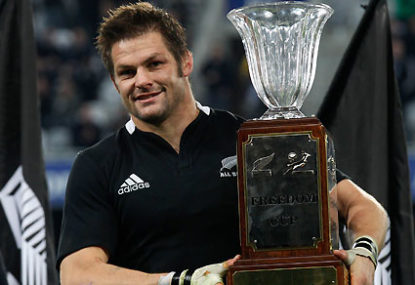In 2011, New Zealand won the Rugby World Cup because they had an experienced, battle-hardened core in a squad that had nine players with more than 50 Test caps.
Richie McCaw was 30 and playing in his third consecutive World Cup. He was not the only three-in-a-row World Cup warrior; Dan Carter, Keven Mealamu, Mils Muliaina, and Ali Williams had the same distinction.
Ma’a Nonu, Brad Thorn, and Corey Flynn had played in the 2003 World Cup; Tony Woodcock, Andy Ellis, Conrad Smith, and Isaia Toeava had played in 2007.
The 16 forwards and 14 backs had 1,133 Test caps total entering the tournament; the most experienced All Blacks squad ever assembled.
Seven players had fewer than a dozen caps: Ben Franks (11), Victor Vito, Sonny Bill Williams, Israel Dagg (7), Zac Guildford (6), and Colin Slade (5).
There were a few tough omissions, or so it seemed at the time: Liam Messam, Wyatt Crockett, and Jarrad Hoeata. As we know, the Beaver, Stephen Donald, who owns 23 All Black caps, found redemption for his Hong Kong nightmare, and kicked New Zealand to a typically grinding finals win, in which Woodcock scored an atypical Kiwi try from a set move.
In 2007, Cup winners South Africa took a very experienced squad to France. John Smit (67 caps), Os du Randt (72), CJ van der Linde (39), Bakkies Botha (35), Victor Matfield (58), Schalk Burger (31), Juan Smith (32), Danie Rossouw (24), Fourie du Preez (30), Butch James (18), Jaque Fourie (29), Bryan Habana (27), and Percy Montgomery (85) formed a nucleus, allowing newcomers like 8-cap Frans Steyn and JP Pietersen (6) to flourish on a strong platform of almost 1,000 squad caps.
In 2003, England won with a team that included 66-cap Neil Back, 51-cap Kyran Bracken, Mike Catt (61), Lawrence Dallaglio (65), Matt Dawson (57), Will Greenwood (47), Richard Hill (63), Martin Johnson (84), Jason Leonard (113), Mike Tindall (33), Joe Worsley (30), Phil Vickery (38), and of course, Sir Jonny Wilkinson (52).
In fact, all four of the last victors have fielded experienced squads. England coach Stuart Lancaster may have been guilty of being too formulaic when he claimed 600 caps is a minimum for a match-day squad, and in 2012, he set 663 as his target for aggregate England caps for his 2015 World Cup team. New Zealand and South Africa will comfortably surpass 663; it is still not clear if Lancaster, who set his own benchmark, can.
There are some caveats to mention: a five-minute substitute appearance is a cap. So Springbok super-sub Patrick Lambie and the All Blacks’ indispensable Aaron Smith have about the same number of caps (even though a minutes-on-the-field comparison would be a 2:1 ratio favouring Smith).
Also, rugby is a game of combinations. A seasoned front row that knows each other, a midfield defensive duo, locks that complement, a loose trio hunting cohesively, and of course, the scrumhalf and flyhalf nerve centre. No team has a 100-cap combination in all of these units, of course. But World Cup winners tend to have at least one defining combination.
So, Matfield and Botha might be seen as the glue to South Africa’s 2007 win. And Steve Hansen will have a hard time overlooking the Ma’a Nonu-Conrad Smith midfield partnership, no matter how slow Smith has become, and even if Williams seems more attractive at 12.
In addition, it is not all about what happens on the field. A World Cup win requires a culture on the practice field, in the sheds, at dinner, in the rooms, and on the road. A young guy who has struggled to learn professional habits, such as Trevor Nyakane, can be paired with Tendai Mtawarira, and will tend to follow the Beast more than a sermon by Heyneke Meyer.
New Zealand are prohibitive favourites to repeat as champions. They will begin their campaign in England with several tried-and-tested combinations: Brodie Retallick and Sam Whitelock have played together as All Blacks 23 times. That may not sound like a lot, until you compare it to other teams.
Aaron Smith and Aaron Cruden have combined 18 times; which is six more times than Smith has played with Carter. A back three of Julian Savea, Ben Smith, and Israel Dagg has played together 13 times.
Hansen can name front-row, back-row and centre combinations with specific experience of winning a World Cup.
Wales might be able to field well-oiled front-row, back-row and centre combinations in Jamie Roberts and Jonathan Davies, George North, Alex Cuthbert and Leigh Halfpenny (21 starts together), and Dan Lydiate, Sam Warburton and Taulupe Faletau (19 joint appearances).
Yes, Hansen has introduced more than 20 new players in the last three seasons, but it is the grizzled core that allows the All Blacks to survive a Test match like the Boks’ Wellington onslaught last year, when ‘winning ugly’ is the best thing, or when a late burst by mentally tough players is needed to steal it at the death.
Also, I have to point out that while naming an inexperienced side virtually guarantees you will not win the Cup, loading up on 800 or more caps does not mean you will win, either, as a haunting memory of an Australian playing ‘Waltzing Matilda’ in the wee hours after a certain quarter-final in Wellington in 2011 bears witness.
Coach John Smit named the most experienced team in Springbok history for that match (836 caps); and he even picked himself over Bismarck du Plessis.





























































































